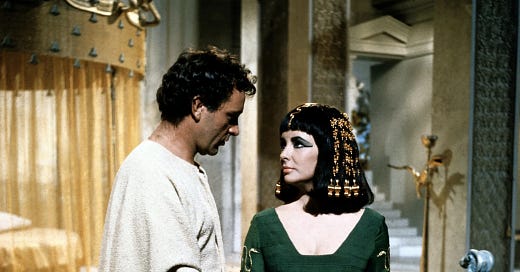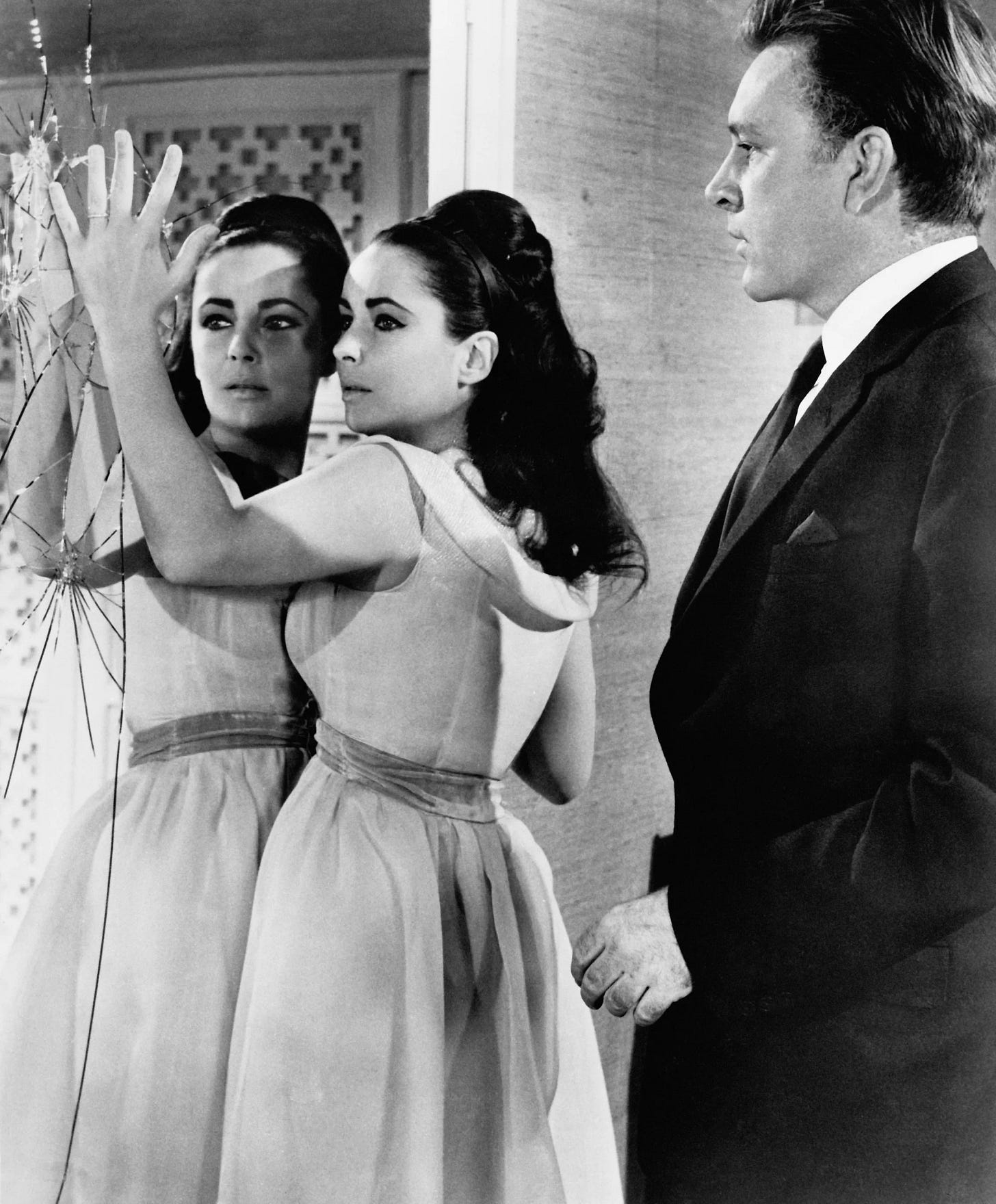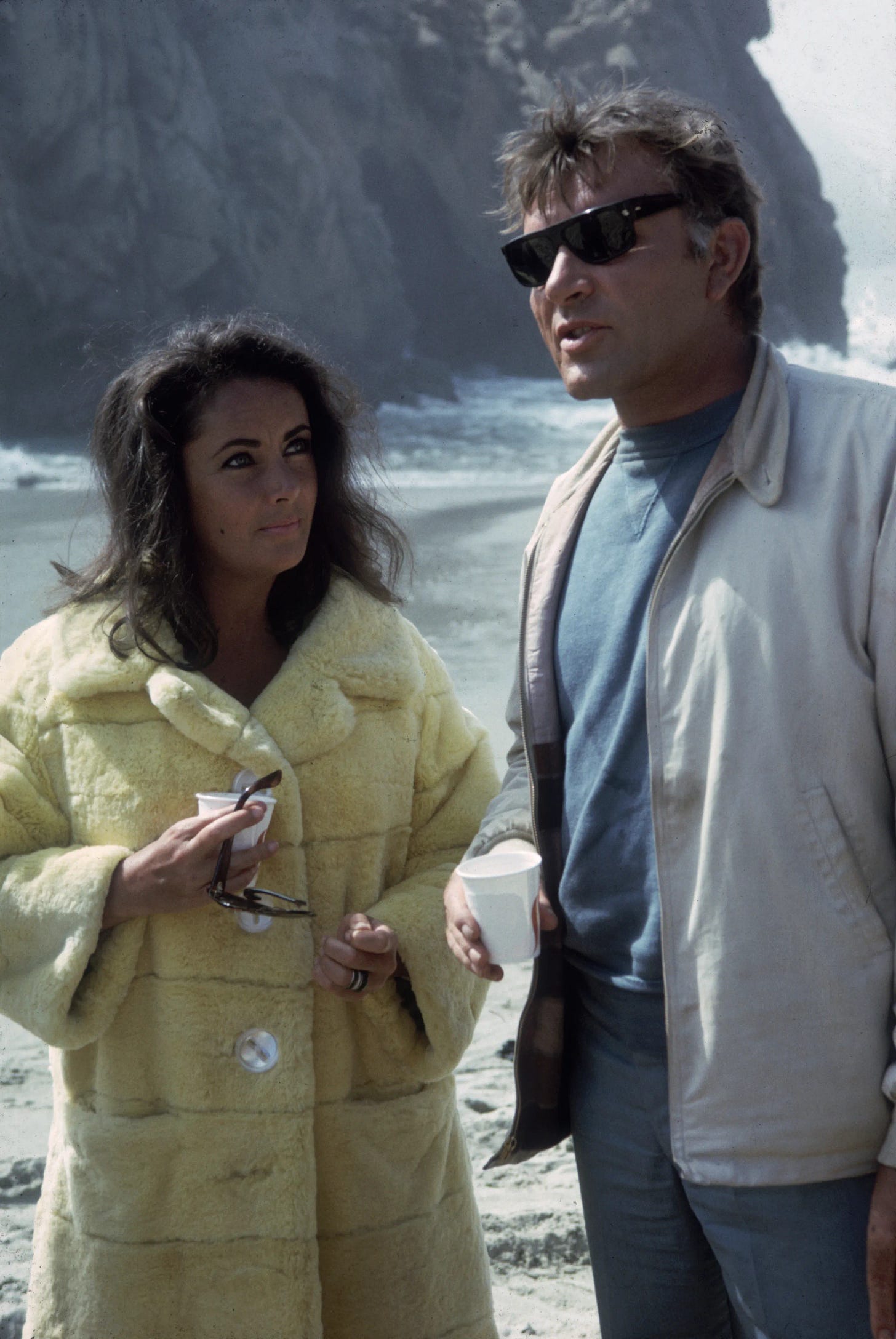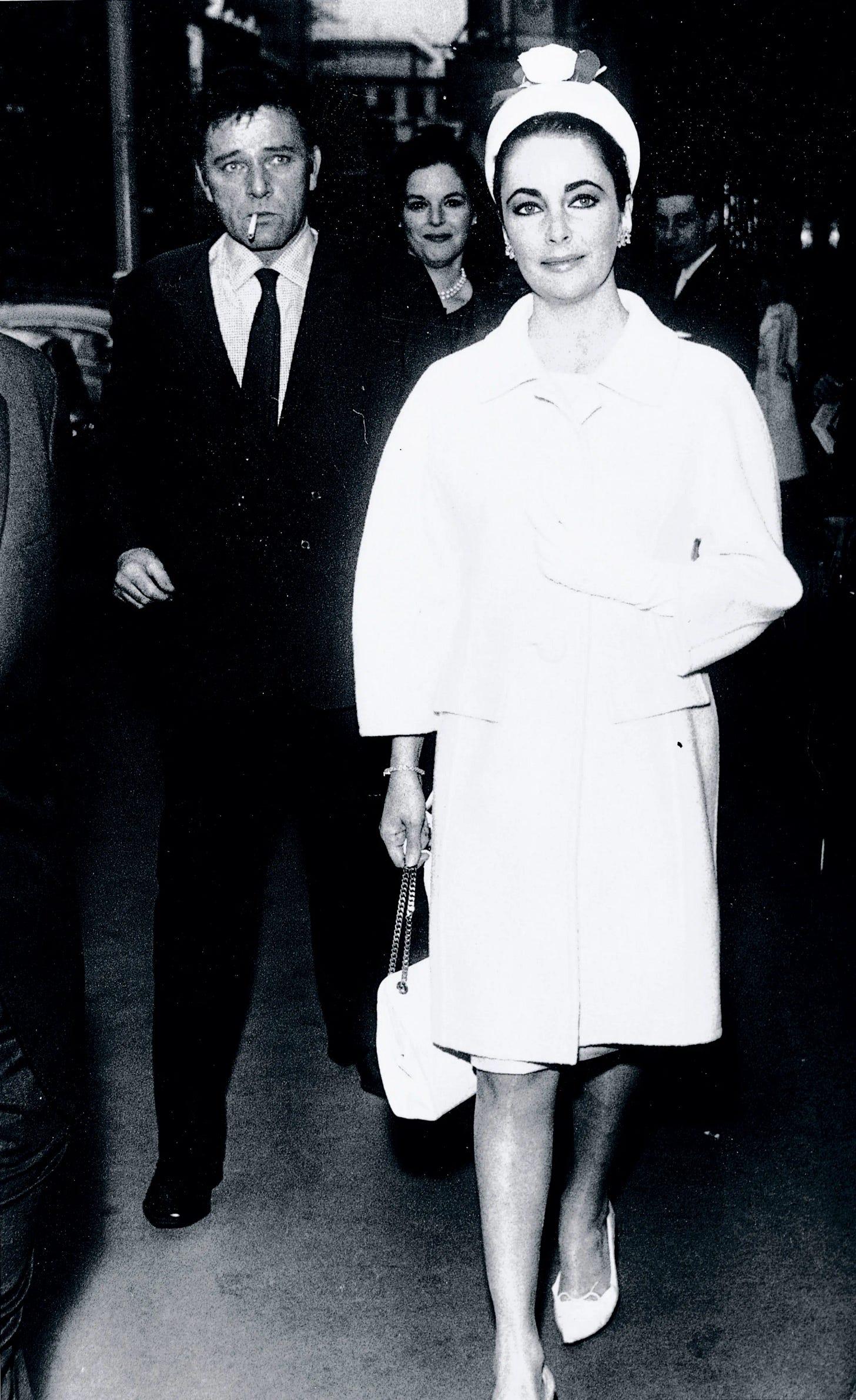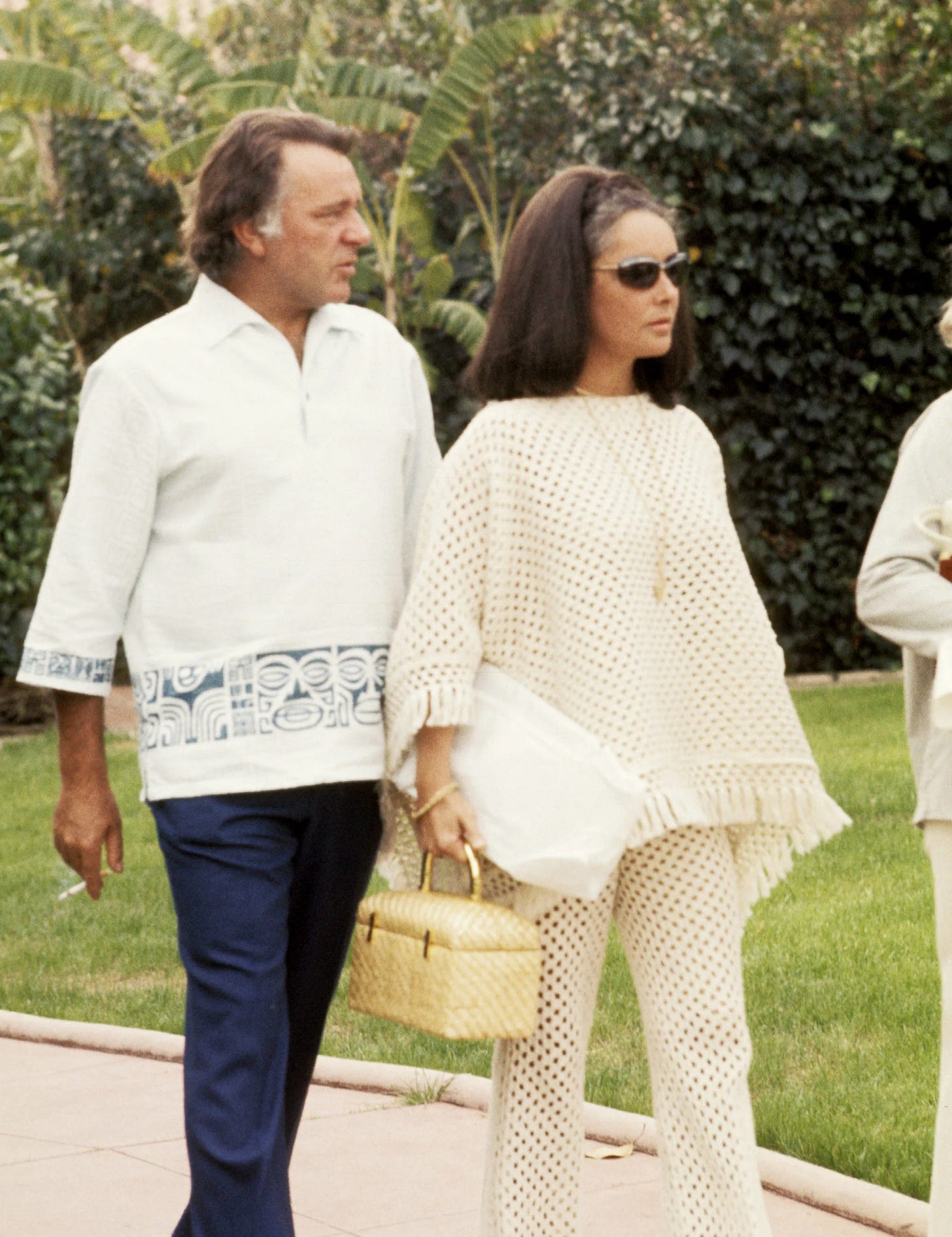Last weekend, I finished reading Sam Kashner and Nancy Schoenberger’s Furious Love: Elizabeth Taylor, Richard Burton and the Marriage of the Century. The book transported me, and I felt hollow and devastated when finishing it! I have now sat with it for a few days and regrouped.
To get it out of the way, I do want to warn that the book is slightly repetitive and could have done with a bit more editing. I only knew the summary version of Liz and Dick’s story, so I did not mind that some passages felt repetitive, but I also did not want the book to end so take that how you will! I must also add that my movie culture is shameful, but I had seen Who’s Afraid of Virginia Woolf and Cleopatra, both of which I loved. While reading Furious Love, I watched The Sandpiper, for its Big Sur setting, and The V.I.P.s for the 60s travel glam.
Elizabeth Taylor and Richard Burton made 11 films together, they married and divorced each other twice. Their love is a story of excess, turmoil, passion, violence, and lifelong mutual obsession. They lived as nomads, hopping from hotels to their boat, traveled the world with an entourage, avoiding taxes and quarantines for their many pets. More than their incessant fight and make up cycle, I enjoyed reading about their travels, or the many endearing nicknames they had for each other. Still my jaw was on the floor when I read some of the cruel things they would say to one another - such as Richard Burton continuous fat shaming. Though Liz always made him pay for it.
At one point, knowing that Richard was "in a state of nastiness," she reached out to him across the table.
"Come on Richard, hold my hand."
"I do not wish to touch your hands," he answered cruelly. "They are large and ugly and red and masculine." Elizabeth withdrew her bejeweled hand.
Richard himself was aghast, horrified by his own malignant remark.
He wrote in his diary, as an act of contrition, "[W]hat the hell's the matter with me? I love milady more than my life... one of these days it's going to be too late."
But Elizabeth, not one to wallow in her own or anyone else's bitter-ness, quickly turned Richard's nasty remark to her advantage, making her husband pay dearly for his thoughtless insult. She insisted that now he must really go after the diamond they had both been eyeing, the one owned by Mrs. Paul (Harriet) Ames, the sister of Walter Annenberg, the billionaire founder of TV Guide and former U.S. ambassador to the Court of St. James. The 6942 karat, 1K" long stone was considered the largest and most expensive diamond in the world.
It was set in a platinum ring between two smaller side diamonds. "It will make my ugly, big hands look smaller and less ugly!" Elizabeth teased.
Still, Liz was married three times before marrying Dick, and while these marriages are mere footnotes in their furious love, some of these experiences were undeniably traumatic. Her first husband was the hotel heir, Nicky Hilton. Even though marrying granted her independence from her parents and MGM, Liz realized the wedding had been a mistake within weeks, as Hilton was abusive and a heavy drinker. She was granted a divorce on the grounds of mental cruelty within eight months. Her second husband was Michael Wilding, with whom she had two sons. Wilding was 20 years her senior, and Liz drifted away from him as she became more mature and confident in herself. Wilding’s fading career was a particular source of strife in their relationship, and the two were separated after four years of marriage. Liz’s third husband, Mike Todd was said to have been the opposite of Wilding, a self-made man with an outsized personality, impulsive and apparently also knocked her around a few times… Dubbed by the magazines as the love of her life! Todd was killed in a plane crash thirteen months after marrying, leaving Liz widowed and inconsolable.
Bonding over their shared grief, Liz would then marry Mike Todd’s best friend, Eddie Fisher. Eddie reminded her of Todd, and their relationship began as an affair, as Eddie Fisher was married to Debbie Reynolds. Liz was called a homewrecker by the press, and Debbie voiced her powerlessness to keep her man in the face of the world’s most beautiful woman. Eddie Fisher was also abusive, but mostly mentally ill, waking her up in the middle of the night with a gun pointed to her head. It is now believed that he struggled with bipolar disease.
Richard Burton wrote in his diary about the moment he first saw Liz: “A girl sitting on the other side of the pool lowered her book, took off her sunglasses and looked at me. She was so extraordinarily beautiful that I nearly laughed out loud. She was unquestioningly gorgeous...She was a dark unyielding largess. She was, in short, too bloody much.”
Liz and Dick’s affair started on the set of Cleopatra, while Liz was still married to Eddie Fisher, and Dick was married to Sybil Williams. Their affair, or Le Scandale, as Dick would refer to it in his diaries, was a turning point for celebrity culture, and invade their private lives forever.
In my opinion, one of the things that the book does best, is situating the state of their lives and marriage in terms of their films. Funnily enough, their roles often mirrored their dynamics. For instance, the plot of The Sandpiper deals with adultery, and therefore capitalized on Le Sandale. But then again, the book also suggests that Liz would sometimes engage in a sort of “reverse Method Acting” whereby she would take inspiration from her films and insert that drama into her life. Particularly while filming Who’s Afraid of Virginia Woolf, Liz admitted to becoming her character, Martha.
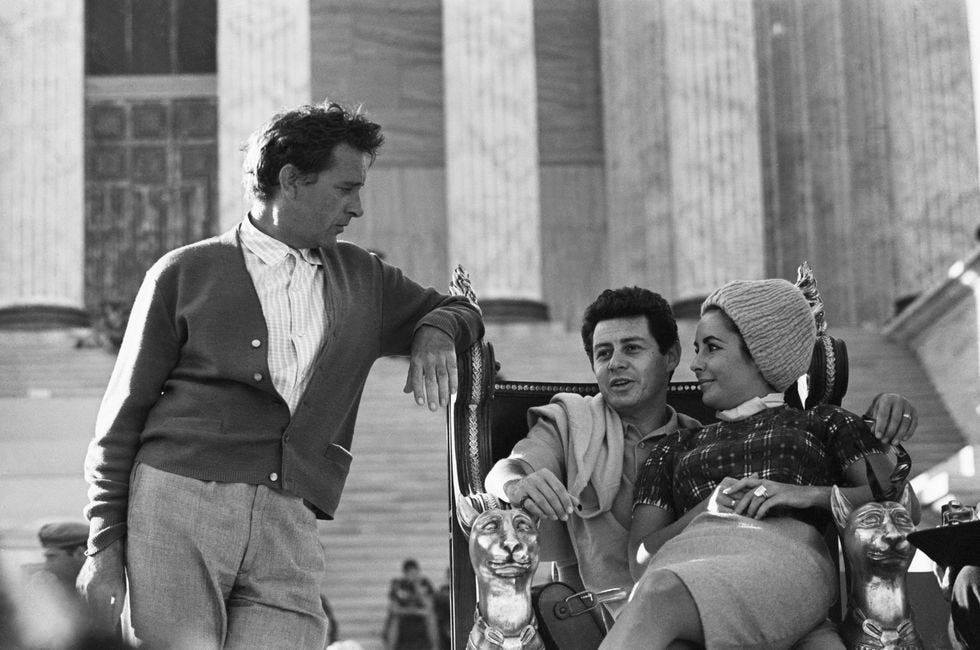
While the premise of the book is Liz and Dick’s relationship, it is important to acknowledge that Liz lived through a lot before she met Dick (and the reverse!). Liz was a child actress and suffered many health issues from a young age. She was quickly put on pills, which led to a lifelong addiction (as well as an addiction to alcohol later), which the biography kind of skims over. The book alludes to some of the ways in which Liz’s life was impacted by her early start in the film industry, for instance, the book provides many letters and journal entries from Dick, though much less from Liz. This goes back to her conditioning as a child actress, as Liz was aware of the risk of her personal letters getting in the wrong hands and being released to the public. As a result, she resisted revealing too much of herself in writing. Dick, on the other hand, poured his heart, his darkest demons, and “graphic testimonies” of his lust out on pages in his diaries and letters. In general, I got the feeling that Liz was more career savvy than Dick, and while she was a great source of motivation for him, Dick often felt as though being an actor was unmanly. Dick would be nominated for seven Academy Awards throughout his life, but would never win one. Especially after their first divorce, it felt as though Dick could never win, seeing as Hollywood had “sided” with Liz. As a result, Richard Burton’s reputation was such of an actor that never fully lived up to his potential, despite his long and successful career.
Richard came to acting from theater, but it seems as though writing was his great passion. He devoured book after book, romantically recited poetry to Liz, and was an incredibly dedicated journaler. His diary entries and letters reveal his demons and complexity, which to me, does the most for the book. He struggled with depression and alcoholism, had many regrets, which made that he went through bouts of gloom throughout his life.
In contrast, I thought that the authors basked in Liz’s glory so much that it often took away from her own undeniable complexity. A lot of the book is putting Liz forth as an “icon” only, and Dick’s journal entries add fascinating layers that make her a multidimensional being, though not as many as I would have liked. (But maybe there’s a different biography for that!). The book does mention the ways in which she was (to an extent) seen as a relatable woman on screen because her weight fluctuated, and she went through menopause, which the women that grew up watching her, related to. (Compared to Marylin Monroe, who to most women was an unrelatable star, passing away well before she reached menopause, and thus only ever appeared as a sex symbol). The book also mentions the evolution of Liz as she ages, the possibility of losing relevancy in the face of a changing industry landscape and younger emerging actors. Both she and Richard wondered when the audience would lose interest in their personal lives, which never seemed to happen! Moreover, many passages mention Richard’s desire to retire, and the pressure he felt to provide and upkeep their indulgent lifestyles.
Liz and Dick divorced for the first time in 1974, reconciled in 1975, and divorced again less than a year later. According to Liz, "After Richard, the men in my life were just there to hold the coat, to open the door. All the men after Richard were really just company.” Liz married her sixth husband, John Warner soon after her divorce. Warner was a Republican politician, and Liz moved to Virginia for him, temporarily paused her career. She was told to quiet her style, wear muted colors, and blend in with other politician wives. She gained weight, became further addicted to prescription pills, drank even more, and became depressed, then left him! Liz then dated a few actors, and was briefly engaged to a lawyer named Victor Lune, though would break it off when Richard passed away. Richard, on the other hand, remarried twice after Liz. First to the model Suzy Miller, former wife of James Hunt, and then to Sally Hay, a production assistant that he met while working on a theater production. Famously and tragically, Sally did not allow Liz to attend Dick’s funeral.
In the end, I loved the book and would recommend it for its sheer page turning qualities! I would love to read Richard Burton’s diaries, because these extracts were the most revealing to me. Ultimately, I think their behavior was unhinged and I wasn’t always convinced by the overt mythologization of their marriage by the authors. Don’t get me wrong, I ate it up! But thinking about the reality of their fights and the violence beyond the page, especially in the context of both of their alcoholism, puts their tumultuous relationship in a different light, often a tragic one. The story is so extraordinary in itself, that I sometimes found the authors’ over-the-top bias a bit unnecessary. Still, the book is equally entertaining, heartbreaking and hilarious in its eccentricities. And as Kashner and Schoenberger put it, their tabloid personas, Liz and Dick, were their best roles.
Until next week,
Franny
